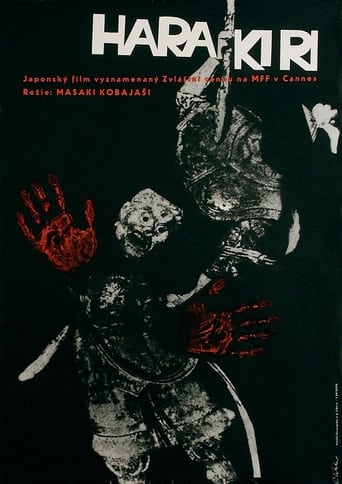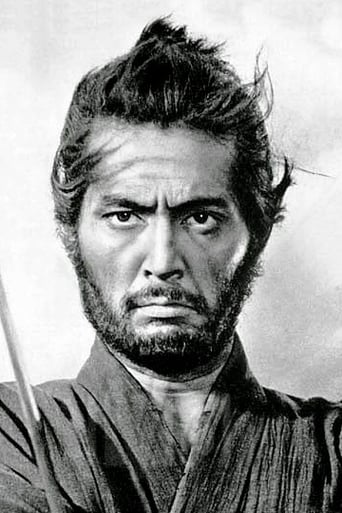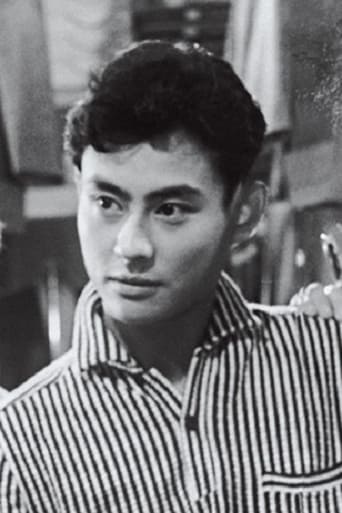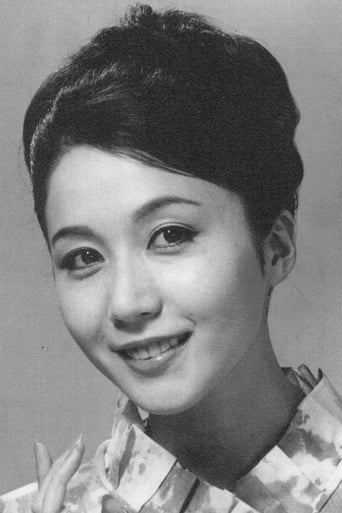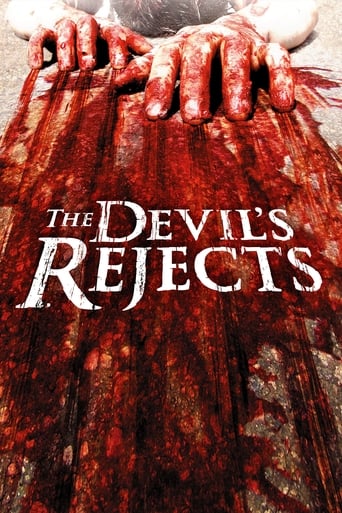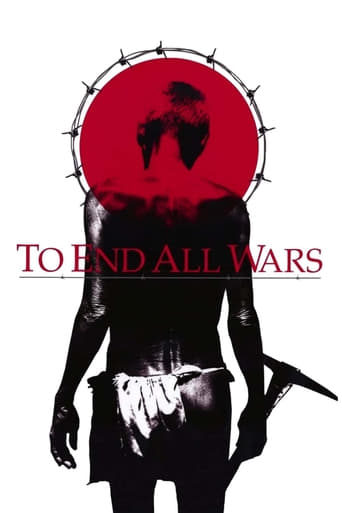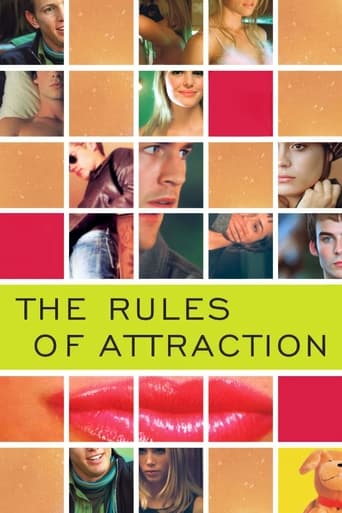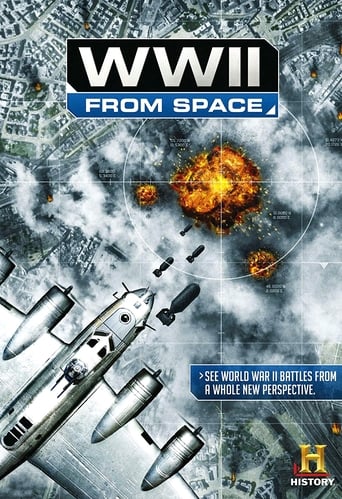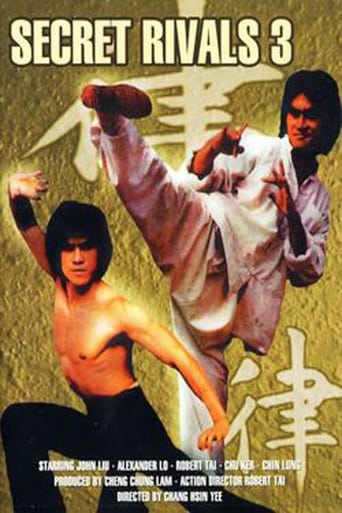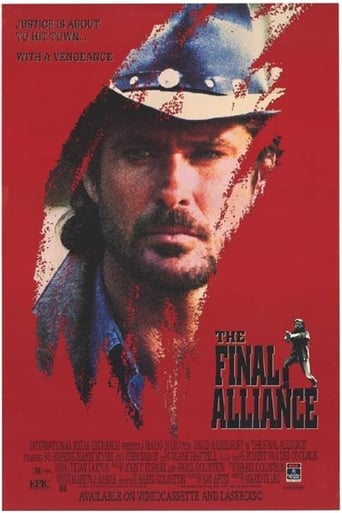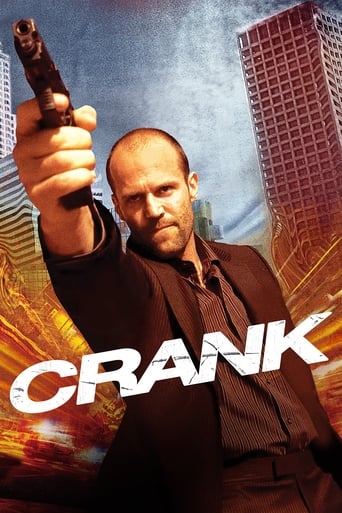Harakiri (1963)
Down-on-his-luck veteran Tsugumo Hanshirō enters the courtyard of the prosperous House of Iyi. Unemployed, and with no family, he hopes to find a place to commit seppuku—and a worthy second to deliver the coup de grâce in his suicide ritual. The senior counselor for the Iyi clan questions the ronin’s resolve and integrity, suspecting Hanshirō of seeking charity rather than an honorable end. What follows is a pair of interlocking stories which lay bare the difference between honor and respect, and promises to examine the legendary foundations of the Samurai code.
Watch Trailer
Free Trial Channels
Cast


Similar titles
Reviews
the leading man is my tpye
If you're interested in the topic at hand, you should just watch it and judge yourself because the reviews have gone very biased by people that didn't even watch it and just hate (or love) the creator. I liked it, it was well written, narrated, and directed and it was about a topic that interests me.
The story, direction, characters, and writing/dialogue is akin to taking a tranquilizer shot to the neck, but everything else was so well done.
One of the film's great tricks is that, for a time, you think it will go down a rabbit hole of unrealistic glorification.
Definitely the best samurai flick that was not done by Kurosawa! In fact it actually surpasses many of his masterpieces! The brilliant cinematography and intense swordplay is complimented by an intricate and well told story that stays with you.
The first shot of Harakiri is an imposing suit of samurai armour, seated on a bench amongst cinematic coils of smoke in the air. I say seating, because despite its hollowness, it's posture is imposingly life-like, almost as if at the call of war it would come to life and march off to battle. This must be how the Ii clan see this glorious suit of armour; even in peacetime it is more than just a tool for means of driving back enemies, but a symbol for honour, strength, loyalty and absolute morality. Of course as they prosper, the peacetime has released many ronin, now master-less and without a trade or living, into the wild wandering. This is really a film for a repeat watch. On first impression, Motome's pleas seem a little self-fulfilling, because why would a samurai committed to seppuku want a two day respite if they have renounced everything and are ready to die? His actual act of seppuku too, is extremely hard to watch - Kobayashi doesn't need to show actually graphic penetration because Ishihama's agony is so anguishing to witness. And yet, there is a hint of comeuppance, because it seems phony that a samurai would carry around a fake, bamboo version of his livelihood. On a second watch, these scenes are filled with such a tragic desperation once we know the back-story. The blunt, ironic cruelty of the bamboo strikes becomes heartbreaking because he has already sold his real blades for his family - what is a samurai without his blade? We know without a doubt he would return in two days this time. Doubly so, Hanshiro weeps because he has kept his own blade, foolishly holding onto a past relic much like the witnesses around him do so. Kobayashi has maintained such a steady, tense rhythm throughout the two hours and 13 minutes. Not once is there a line of misplaced dialogue, or a glance that was not filled with the appropriate amount of venom. We see one 'extortion' attempt, and then another from Hanshiro, so of course we await some sort of twist or connection. There is no sense of contrivance when he delays the act, no sense of artificial direction behind these characters. Tatsuya Nakadai is effortless. He has the knack for transforming so seamlessly into his character and becoming every ounce of them - here it is in his blank, almost traumatised expression as he narrates; it could not be more immediately obvious that this is a man who has lost everything. And then there is the little remaining spark underneath that drives this tale of revenge (his cackles as he bemusedly wonders on the fate of three men he has already taken care of), although it seems more vital to expose the Ii clan for the facade that they uphold. The framing device of the narration of the guest book is what seals it. It simultaneously empowers and suppresses the events of the film; even as we witness the despair of Saito, having his pretense so viciously and comprehensively demolished, he quickly rewrites the history books because he has that power (there's a cruel irony to the way he orders the forced seppuku of the three disgraced warriors - the noble ritual being marred). That stirring, dramatic duel in the windswept plains, gone. That desperate, climatic battle, where we might conventionally expect a one-man massacre and a little poetic justice, gone. And even as he attempts to go out on his own terms, Hanshiro is shot by a modernised death-dealer. It recalls Kurosawa's Yojimbo, in which it was actually Nakadai who wielded the gun and brought forth the end of the age of samurai. But here, it becomes a more potent, universally symbolic end. This cruel world does not bend to sentiment. Appearances must be upheld, even sometimes in the face of moral transgression. Hanshiro smashes the suit of armour, but it is gleaming and whole again soon. But it is of course a hollow ideal. All the honour in the world could not materialise a decent man to fill its shoes.
Harakiri is a must see film. A ronin's appearance bears much more significance than it seems at first glance. As his tale unfolds, the tension in the film can be felt as it grows and grows incredibly until it is nearly unbearable. When the tension breaks in the showdowns between our hero and the samurai of the house of Iyi, it is with a vitality that bursts from the screen. The ending is incredible, tying together all the themes in a bloodbath that offers no hope that this will not happen again. The selfish and cruel house of Iyi grows in stature and there seems to be no prospect of betterment for the honourable warriors. The film exposes the bushido code as a farse wherein the honourable are exploited by the selfish. Incredibly shot, written, acted, it is an astounding achievement by director Masaki Kobayashi. Go see it at your next opportunity.
This has to be the best movie I have seen in a while. Good luck to me that I would like to pass on to you.We have two warring narrators. The first begins the film as an entry in his journal as local governor of a wealthy country estate. The film is closed with him finishing his entry, some days later. This official narrative deviates from what we see at the end.His story: one, then a second unattached ronin appeal to commit suicide in their courtyard. The first of these it is plain is just looking to be paid to leave, but our narrator is very strict about cleaving to that ronin's story. If he says he wants to kill himself, well then he must. This poor man had sold his sword and was now carrying bamboo, and it is this that he was forced to use. The resulting death is disturbing.So midway in the film, we have a samurai who has suffered because he was forced to live his story, forced by the narrator-governor who we later watch not live the story he has created and instead change it to suit.Now along comes an older samurai with the same request. He is dealt with in the same manner, but insists on telling a story to the assembled household before killing himself. He tells an amazing story: a fall from grace of his master, the dissolution of the household, poverty. His frail daughter and her son lay dying without a few coins for a doctor. The man's son is his daughter's husband, and it is he that came and was forced to die. The wife and son do as well, shortly after. Details of that death were told by the governor to the elder samurai earlier, though known because of the mocking way the body was returned.Until now, we have a classic case of warring narrative. We have the captive audience assembled. One storyteller is an official, so much so that he controls the official version of the film's story. The other has power in his gritty, true story. That story, incidentally is very close to what I consider noir: a random innocent fellow is cast in circumstances that seem full of circumstance and accident. The events of his life are played out not as they would in real life but as they would in a fictional life in a story told by others.Truth versus power in a struggle for the story of the film, essentially a struggle for the allegiance of the outer audience: us.The two beings as they face off are perfect in small mannerisms belying tension.Then slowly, the governor's world explodes as we learn new bits of the elder ronin's story of recent events. Many die.We (the audience) and control of all the cinematic effects was won by the ronin. Our governor is seen at the end writing the official account to be seen by his master that for his safety eradicates all story on both sides. The main actor, the winner, features in some of Kurosawa's best work as well.

